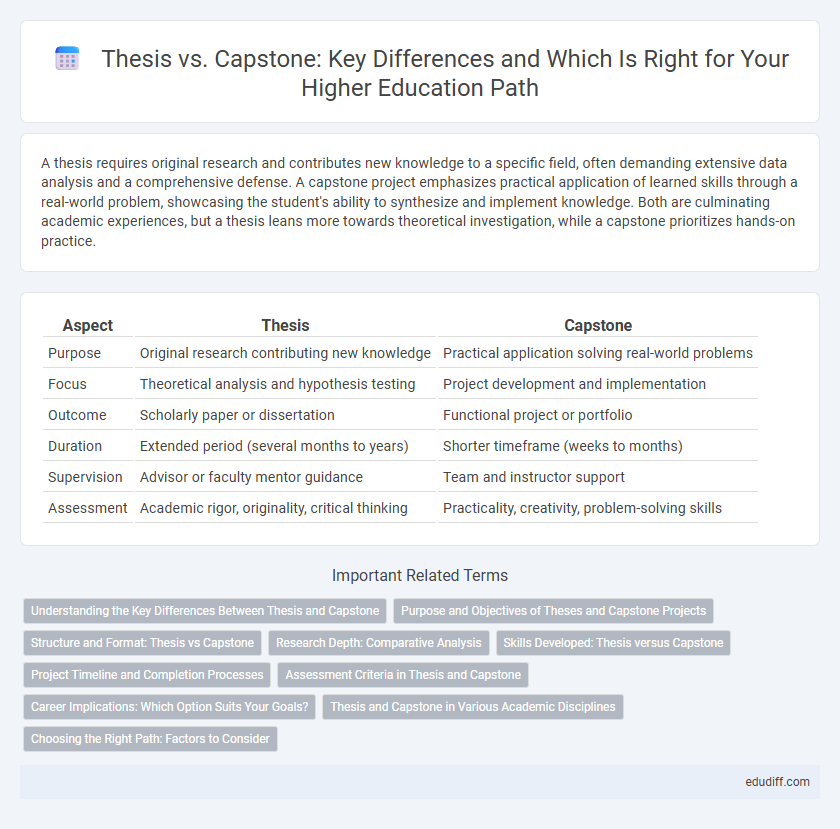A thesis requires original research and contributes new knowledge to a specific field, often demanding extensive data analysis and a comprehensive defense. A capstone project emphasizes practical application of learned skills through a real-world problem, showcasing the student's ability to synthesize and implement knowledge. Both are culminating academic experiences, but a thesis leans more towards theoretical investigation, while a capstone prioritizes hands-on practice.
Table of Comparison
| Aspect | Thesis | Capstone |
|---|---|---|
| Purpose | Original research contributing new knowledge | Practical application solving real-world problems |
| Focus | Theoretical analysis and hypothesis testing | Project development and implementation |
| Outcome | Scholarly paper or dissertation | Functional project or portfolio |
| Duration | Extended period (several months to years) | Shorter timeframe (weeks to months) |
| Supervision | Advisor or faculty mentor guidance | Team and instructor support |
| Assessment | Academic rigor, originality, critical thinking | Practicality, creativity, problem-solving skills |
Understanding the Key Differences Between Thesis and Capstone
A thesis involves original research contributing new knowledge to a field, typically required for academic degrees like a master's or PhD, emphasizing rigorous methodology and theoretical analysis. A capstone project integrates and applies existing knowledge to practical problems, often completed in professional or undergraduate programs to demonstrate comprehensive understanding and skills. Key differences lie in research scope, purpose, and the emphasis on innovation versus application within higher education outcomes.
Purpose and Objectives of Theses and Capstone Projects
Theses primarily aim to contribute original research to a specific academic field by addressing a research question or hypothesis, emphasizing theoretical understanding and scholarly advancement. Capstone projects focus on applying practical skills and knowledge to solve real-world problems or create tangible outcomes, often integrating interdisciplinary approaches. The objective of a thesis is to demonstrate mastery of research methodologies and critical analysis, while capstones emphasize experiential learning and professional readiness.
Structure and Format: Thesis vs Capstone
A thesis typically follows a formal structure including an abstract, literature review, methodology, results, discussion, and conclusion, designed to contribute original research to the academic field. Capstone projects emphasize practical application and problem-solving, often structured around a project proposal, implementation, analysis, and reflection, with greater flexibility in format. Both formats require a clear introduction and conclusion, but the thesis is more rigid in adhering to academic research standards, while the capstone allows for diversified presentation styles such as reports, presentations, or portfolios.
Research Depth: Comparative Analysis
Thesis projects demand extensive research depth with original contributions and comprehensive literature reviews, emphasizing theoretical frameworks and empirical data. Capstone projects focus on practical application of knowledge, integrating existing research to solve real-world problems, often with less emphasis on novel research. Comparative analysis reveals theses prioritize academic rigor and innovation, while capstones emphasize multidisciplinary problem-solving and applied outcomes.
Skills Developed: Thesis versus Capstone
A thesis develops advanced research skills, critical analysis, and academic writing proficiency, emphasizing theoretical depth and original contribution to knowledge. In contrast, a capstone cultivates practical problem-solving abilities, project management, and collaborative teamwork through real-world applications and interdisciplinary approaches. Both processes enhance communication skills, but the thesis prioritizes scholarly articulation while the capstone focuses on professional presentation.
Project Timeline and Completion Processes
Thesis projects typically involve an extended research phase followed by writing and defense, often spanning one academic year or more. Capstone projects focus on practical application with a shorter timeline, usually completing in a single semester through implementation, presentation, and final evaluation. Both approaches require milestone tracking, but capstones emphasize project execution while theses prioritize original research analysis.
Assessment Criteria in Thesis and Capstone
Assessment criteria in a thesis emphasize original research, critical analysis, and theoretical contribution, requiring comprehensive literature review, methodology rigor, and in-depth discussion of findings. Capstone project assessments prioritize practical application, problem-solving skills, and integration of knowledge through real-world projects, focusing on implementation, project management, and reflective evaluation. Both assessments measure academic proficiency but differ in objectives: thesis evaluates scholarly inquiry while capstone assesses applied competency.
Career Implications: Which Option Suits Your Goals?
Choosing between a thesis and a capstone project significantly impacts career trajectories, with a thesis emphasizing deep research skills ideal for academic, research, or specialized industry roles. Capstone projects prioritize practical, hands-on experience and problem-solving abilities, aligning with careers that demand applied knowledge and immediate workplace readiness. Assessing personal career goals alongside industry expectations ensures selection of the path that best supports professional growth and employability.
Thesis and Capstone in Various Academic Disciplines
Thesis projects in disciplines such as humanities and social sciences emphasize original research and theoretical analysis, often culminating in a substantial written document that contributes new knowledge to the field. Capstone projects, prevalent in engineering, business, and health sciences, focus on practical application, integrating knowledge through problem-solving, case studies, or product development. Both formats require critical thinking and synthesis of content, but theses prioritize academic inquiry while capstones highlight real-world implementation within their respective academic disciplines.
Choosing the Right Path: Factors to Consider
Choosing between a thesis and a capstone project depends on academic goals, career aspirations, and learning preferences. A thesis requires extensive research and is ideal for students pursuing graduate studies or research-intensive careers, while a capstone emphasizes practical application and suits those aiming for professional practice. Evaluating time commitment, mentorship availability, and desired skill development can guide students in selecting the path that best aligns with their future objectives.
Thesis vs Capstone Infographic

 edudiff.com
edudiff.com